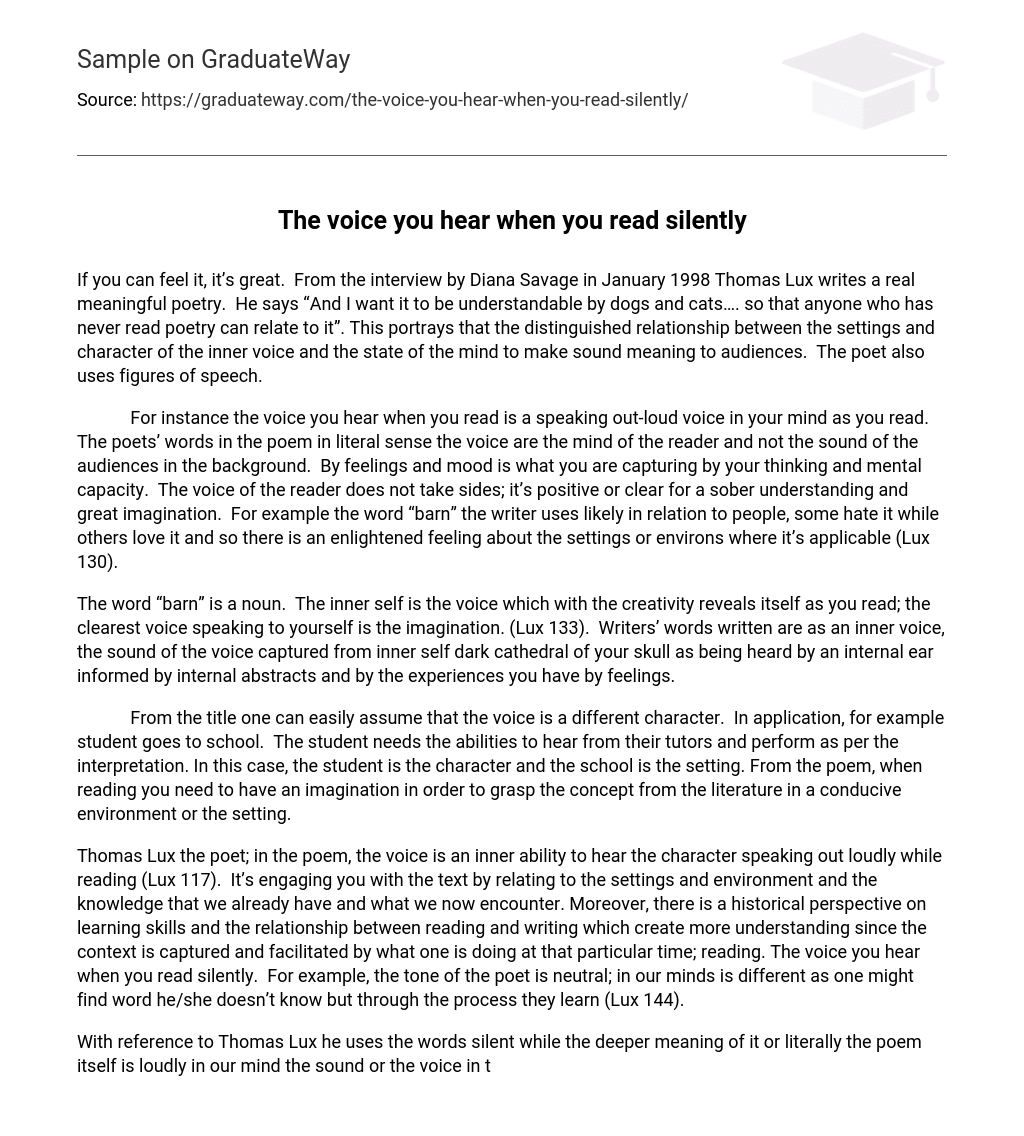If you can feel it, it’s great. From the interview by Diana Savage in January 1998 Thomas Lux writes a real meaningful poetry. He says “And I want it to be understandable by dogs and cats…. so that anyone who has never read poetry can relate to it”. This portrays that the distinguished relationship between the settings and character of the inner voice and the state of the mind to make sound meaning to audiences. The poet also uses figures of speech.
For instance the voice you hear when you read is a speaking out-loud voice in your mind as you read. The poets’ words in the poem in literal sense the voice are the mind of the reader and not the sound of the audiences in the background. By feelings and mood is what you are capturing by your thinking and mental capacity. The voice of the reader does not take sides; it’s positive or clear for a sober understanding and great imagination. For example the word “barn” the writer uses likely in relation to people, some hate it while others love it and so there is an enlightened feeling about the settings or environs where it’s applicable (Lux 130).
The word “barn” is a noun. The inner self is the voice which with the creativity reveals itself as you read; the clearest voice speaking to yourself is the imagination. (Lux 133). Writers’ words written are as an inner voice, the sound of the voice captured from inner self dark cathedral of your skull as being heard by an internal ear informed by internal abstracts and by the experiences you have by feelings.
From the title one can easily assume that the voice is a different character. In application, for example student goes to school. The student needs the abilities to hear from their tutors and perform as per the interpretation. In this case, the student is the character and the school is the setting. From the poem, when reading you need to have an imagination in order to grasp the concept from the literature in a conducive environment or the setting.
Thomas Lux the poet; in the poem, the voice is an inner ability to hear the character speaking out loudly while reading (Lux 117). It’s engaging you with the text by relating to the settings and environment and the knowledge that we already have and what we now encounter. Moreover, there is a historical perspective on learning skills and the relationship between reading and writing which create more understanding since the context is captured and facilitated by what one is doing at that particular time; reading. The voice you hear when you read silently. For example, the tone of the poet is neutral; in our minds is different as one might find word he/she doesn’t know but through the process they learn (Lux 144).
With reference to Thomas Lux he uses the words silent while the deeper meaning of it or literally the poem itself is loudly in our mind the sound or the voice in the poem it’s your voice.
Another illustration is the word ‘barn’ in the poem. The voice, which is your brains, the mind never at this moment as you read says anything neutral from what you know. This words and illustration creates diction to make one understand further concentrating of the voice or the mind. However, the more the inner voice (your mind) concentrates/listens to itself the more the theme and understanding. (Silvery 103). This gives one a deeper thought to reflect on the environment hence setting to have a clear view and positive attitude on the poem.
The poet provides insight and perspective. An attitude that we should reflect on towards the subject or character in application where we are, what we are doing and while reading. Hence asking ourselves what we gain from what we are reading, learning. This cultivates positive attitude in our character and study habits. The poem is varied thus holding us responsible for our thoughts at that particular moment when we are reading and not only restricted to this but also in any other activity that we are doing.
The voice we hear when we read silently, this title not only make one eager to read further but also identifies a great tone which make one read with eagerness because of the fierce poignancy, the lucid compassion from a view that one might have known but assumed the greatness or importance of the whole or part of the existing action. We need to have a connection or a relationship between our emotions and activities and our social lives. In its self the poet is calling us for a responsive reading and writing.
The poet Thomas Lux has a special control of words matching of the subject and for decorum. (Silvery 236). He puts us in a setting or a situation where we are forced to adhere to what and time theme of the poem, where due to use of imagery we relate to the ideas and develop an attitude in this case a positive attitude.
In general the poet is making us respond to situations, be attentive to our surrounding. One can express in conclusion that its’ the call and inner capacity one gets from writing logically and thinking critically procedures a huge change on how one analyses and evaluates such a great piece of work. The voice we have when we read silently.
WORKS CITED
Lux, Thomas. New and Selected Poems, 1975-1995: 1975-1995. Michigan: Houghton Miffin Co., 1997. ISBN 0395858321
Silvery, Deborah. Readings form the Inside Out: Increasing Your Comprehension and Enjoyment of College Reading. United Kingdom: Longman, 2002. ISBN 0321085809





